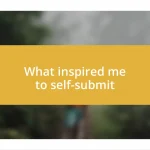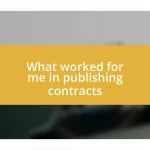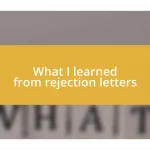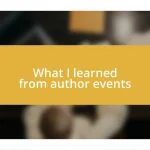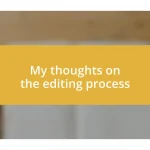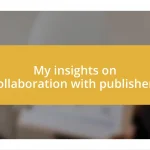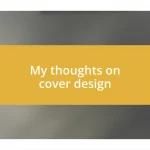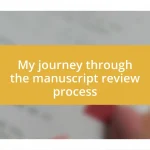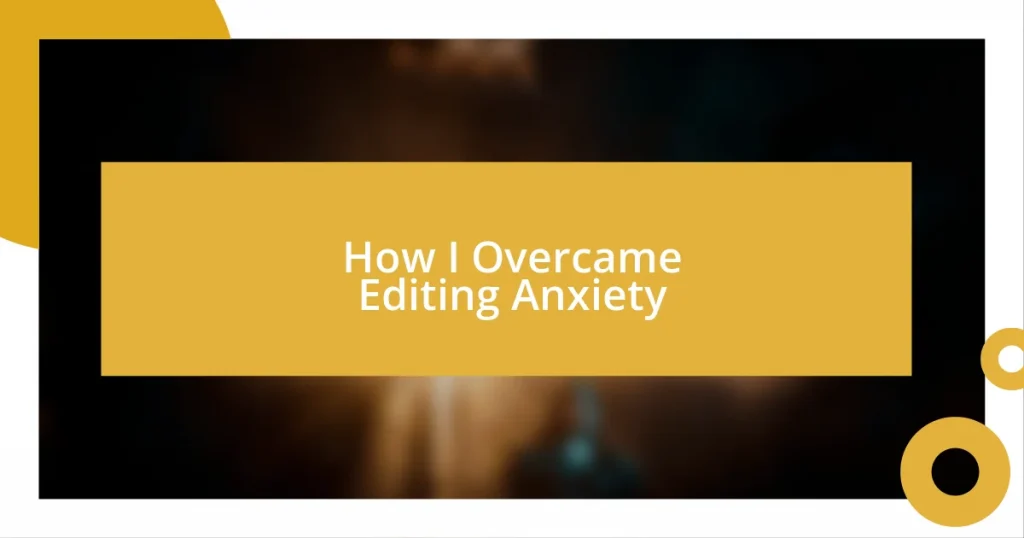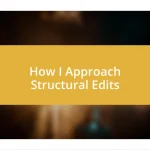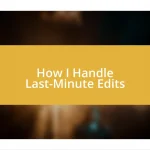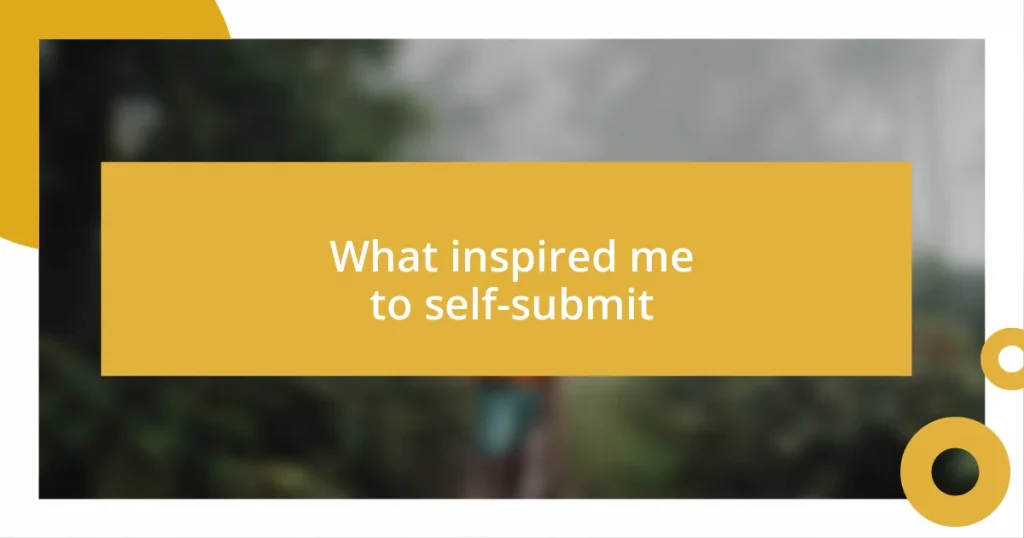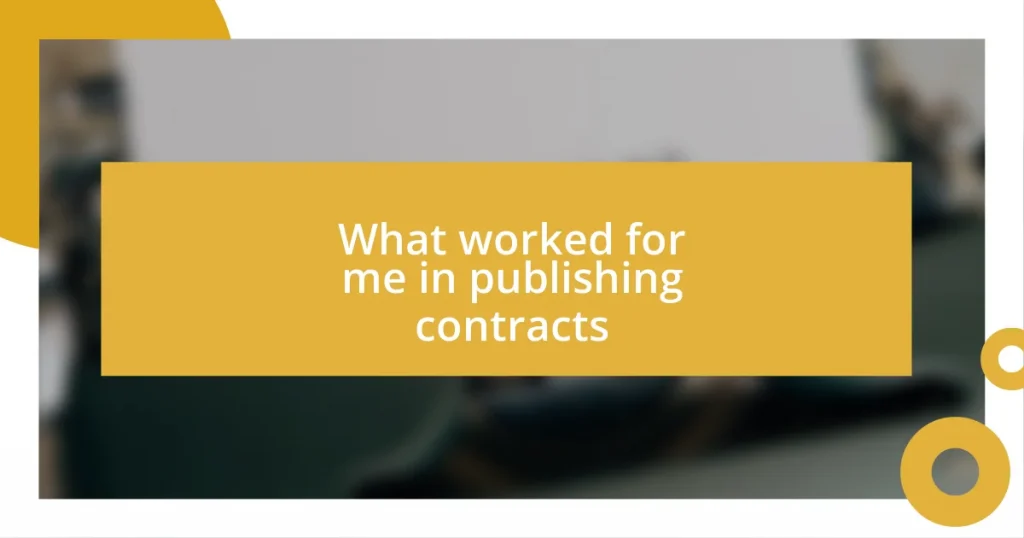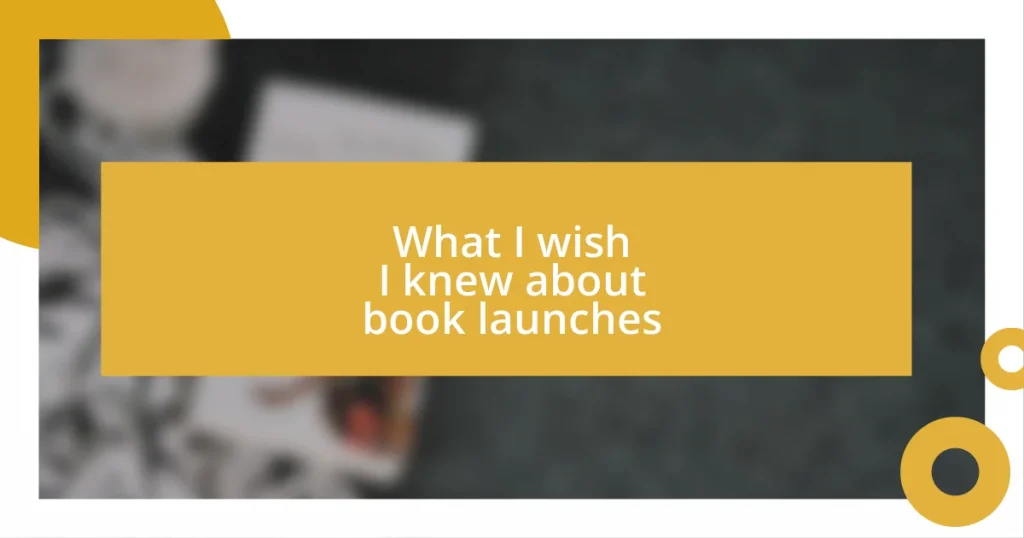Key takeaways:
- Editing anxiety often arises from fear of judgment, and acknowledging this vulnerability can lead to improvement in one’s writing process.
- Creating a productive workspace, free from distractions and equipped with natural light, can significantly reduce editing anxiety and promote focus.
- Seeking feedback from others and celebrating small milestones helps build confidence and reinforces the progress made throughout the editing journey.
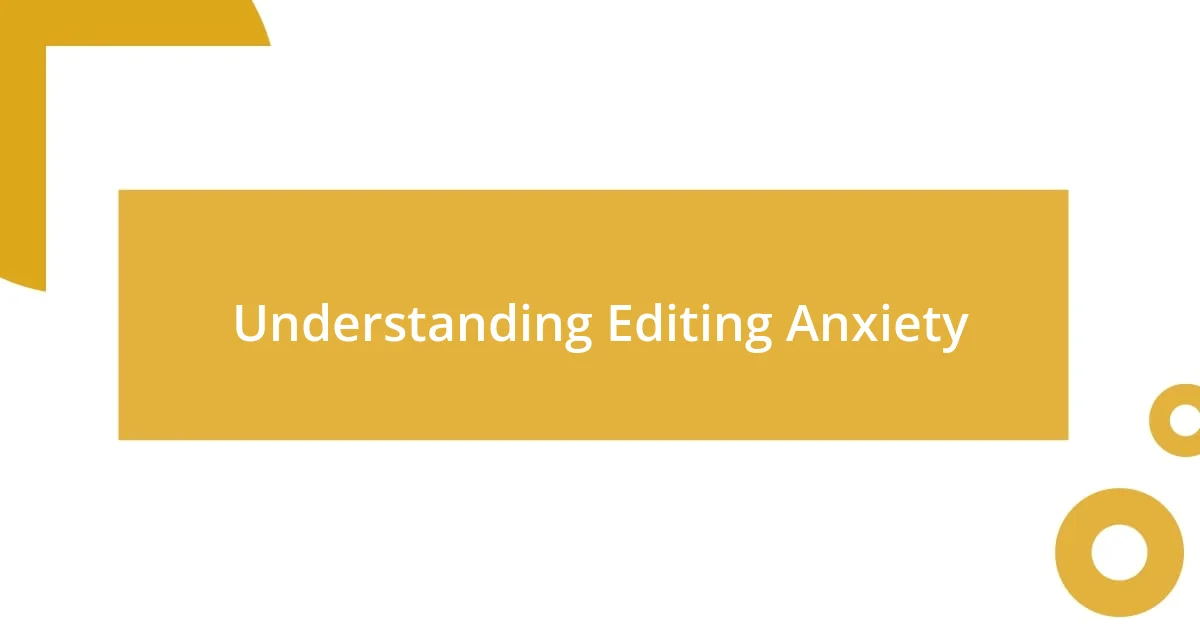
Understanding Editing Anxiety
Editing anxiety often stems from a fear of judgment. I remember the first time I sent a draft to my mentor; my palms were sweaty, and my heart raced. What if they found my work lacking? This fear can create a mental block that stifles creativity, which is something I’ve dealt with more than once.
Sometimes, this anxiety can feel overwhelming, as if a fog has settled over my mind. I’ve had nights where I’d stare at my screen, second-guessing every sentence and thought. Have you ever felt that paralyzing pressure to be perfect? It’s easy to get caught in a loop of self-doubt, but acknowledging these feelings was a crucial step in my journey.
Understanding why we experience editing anxiety can be nourishing. For me, it was a realization that vulnerability is part of the process. I learned that expressing my thoughts openly, without aiming for perfection, could lead to genuine improvement. Isn’t it liberating to know that even the most seasoned writers feel this way?
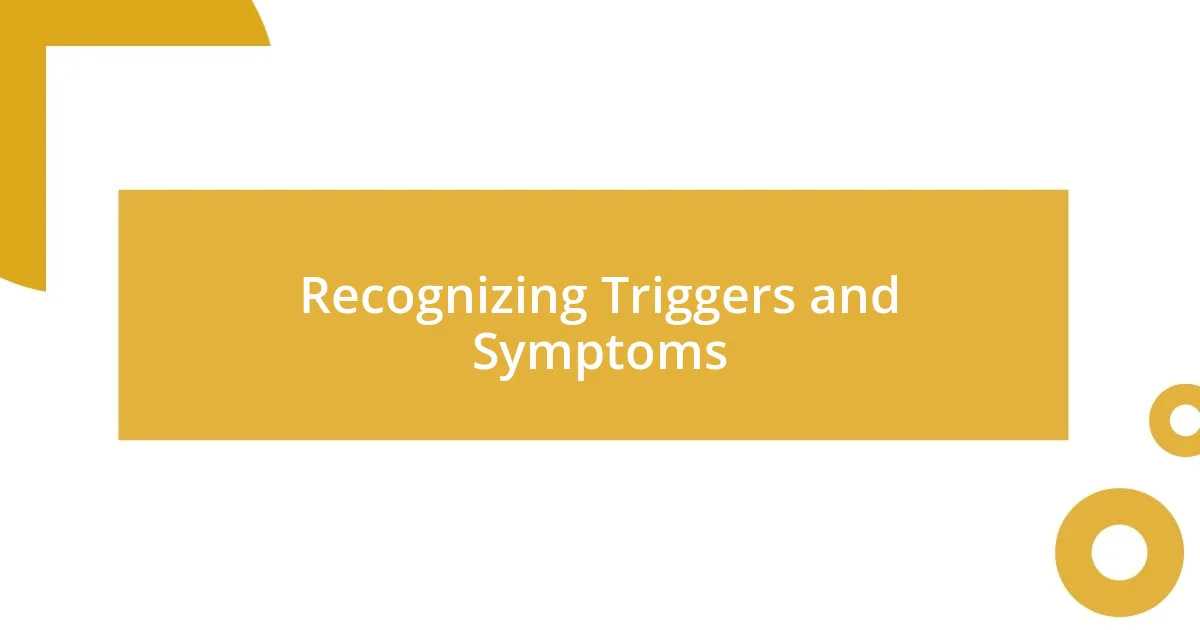
Recognizing Triggers and Symptoms
Recognizing the triggers and symptoms of editing anxiety is essential for taking control of the situation. I found that specific situations, like approaching a tight deadline or sharing my work with others, would send my stress levels soaring. I’d experience a racing heartbeat and feelings of dread, almost as if I were about to step on stage for a performance. It’s fascinating how my body would react even before my mind had fully acknowledged the task at hand.
To help identify these triggers, I started jotting down my experiences. Here are some common signs to look out for:
- Increased heart rate or sweating when opening a document.
- A persistent inner critic telling me my work isn’t good enough.
- Feeling overwhelmed by the volume of edits, leading to procrastination.
- Physical tension, especially in the shoulders and neck, that made it hard to concentrate.
- Avoiding the editing process entirely, opting for distractions instead.
By recognizing these symptoms, I began to develop strategies for coping. It’s all part of the journey towards making peace with the editing process.
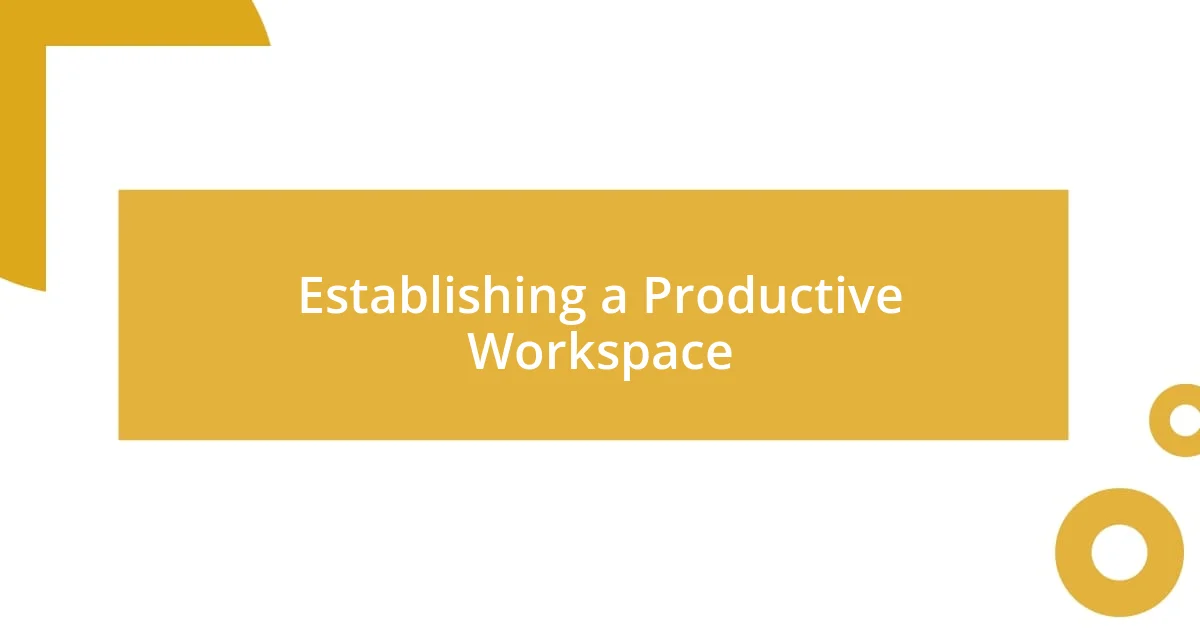
Establishing a Productive Workspace
I’ve discovered that establishing a productive workspace plays a crucial role in alleviating editing anxiety. When I first started editing, my environment was chaotic – papers everywhere, loud music blaring, and constant notifications on my devices. I realized that creating a clear and organized space significantly affected my mindset. Now, I keep my desk tidy and free from unnecessary clutter, allowing my thoughts to flow smoothly.
Lighting is another vital factor. I once tried editing late at night with just a small lamp illuminating my workspace. The dim light made me feel fatigued and uneasy. Shifting to bright, natural light during the day transformed my editing sessions into a more uplifting experience. I found that allowing natural light into my space can enhance my mood and focus. Have you considered how your environment might be impacting your creativity?
Establishing boundaries with technology is equally important. A few months ago, I put my phone in another room during my editing sessions. The difference was astounding! Not only was I more focused, but I also felt more relaxed knowing I wouldn’t get distracted by incoming notifications. This simple change helped ease my anxiety because I could devote my full attention to the task at hand without feeling overwhelmed.
| Workspace Element | Effect on Editing Anxiety |
|---|---|
| Clutter-free Desk | Reduces distractions, promotes focus |
| Natural Lighting | Boosts mood and energy levels |
| Tech Boundaries | Minimizes distractions and increases concentration |
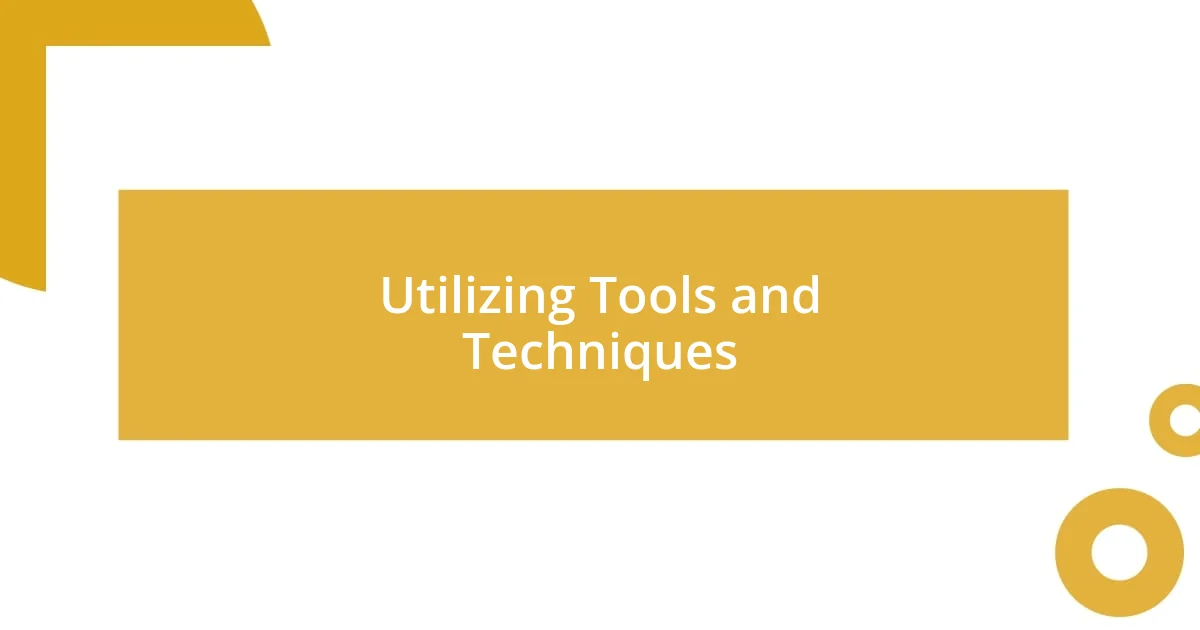
Utilizing Tools and Techniques
Utilizing various tools and techniques has been a game-changer in overcoming my editing anxiety. For instance, I started using editing software that provides built-in suggestions and grammar checks. Initially, I was skeptical, thinking it would only make me reliant on a machine. However, I found that these tools not only offered valuable insights but also alleviated some of my self-doubt by highlighting my progress rather than just pointing out mistakes. Have you ever experienced that moment of clarity when technology works in your favor?
In addition to software, I embraced the power of checklists. Creating a step-by-step list of what I needed to tackle in my editing process broke overwhelming tasks into manageable chunks. It’s interesting how simply crossing off items created a real sense of accomplishment that boosted my confidence. I vividly remember the first time I completed my editing checklist; it felt like I had climbed a mountain. Why not give it a try? You might find that the act of breaking tasks down can significantly reduce your anxiety, just as it did for me.
Moreover, I turned to mindfulness techniques to stay grounded during longer editing sessions. I began incorporating five-minute meditation breaks into my routine, which helped clear the mental fog. Picture this: as I paused to focus on my breath, I could literally feel the tension in my shoulders ease up. This simple technique reminded me that moments of stillness can effectively combat the frantic thoughts swirling in my mind. Why not take a moment to breathe and reset your mindset before diving back into your work?
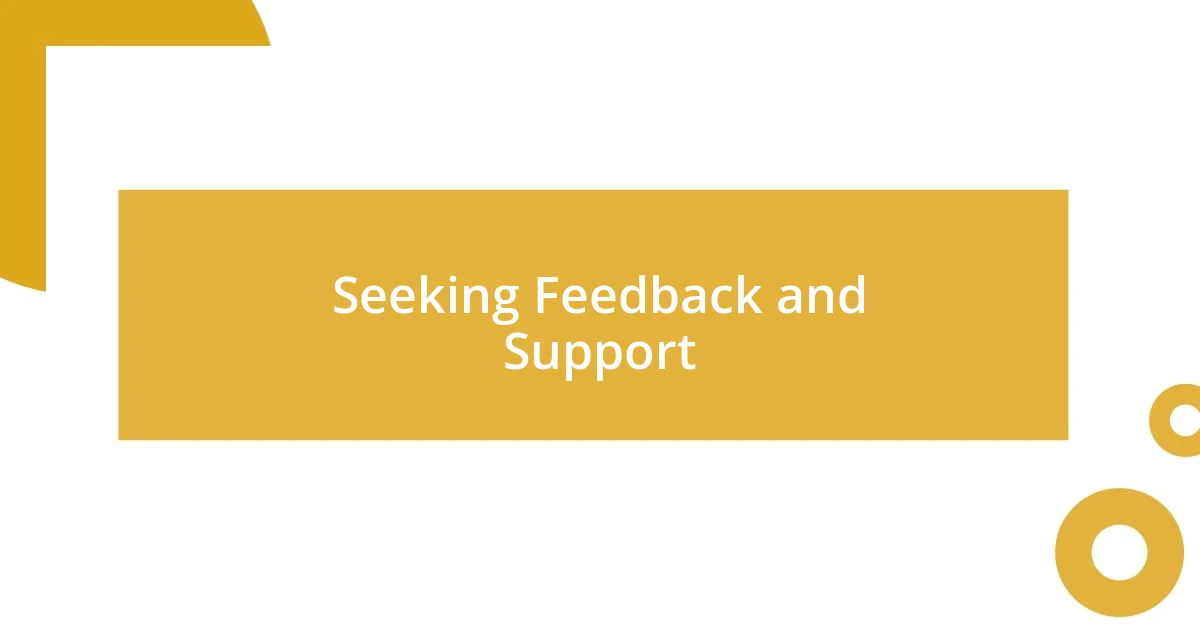
Seeking Feedback and Support
As I began to embrace the editing process, I learned the incredible value of seeking feedback from others. Initially, I was hesitant—what if they didn’t like my work? But one day, I shared a draft with a trusted friend, and their constructive critiques opened my eyes to new perspectives. It was enlightening to realize that feedback isn’t just criticism; it’s an opportunity for growth. Have you ever felt that thrill of collaboration?
Supportive communities can also be a lifesaver. I joined an online writers’ group where sharing struggles and successes became a regular thing. In those moments of vulnerability, I discovered that others shared the same editing anxieties. Hearing their stories made me feel less isolated, and my apprehension started to fade. I find joy in exchanging ideas, and it’s comforting to know that we’re all on this journey together. Why not consider reaching out to a group or forum around your interests?
Another revelation for me was the power of mentorship. I approached a seasoned editor and asked for advice. Their encouragement and wisdom gave me the confidence to tackle my work without second-guessing myself at every turn. The relationship blossomed into a supportive dynamic, reminding me that seeking guidance is a strength, not a weakness. Have you thought about finding a mentor who can guide you through the editing labyrinth?
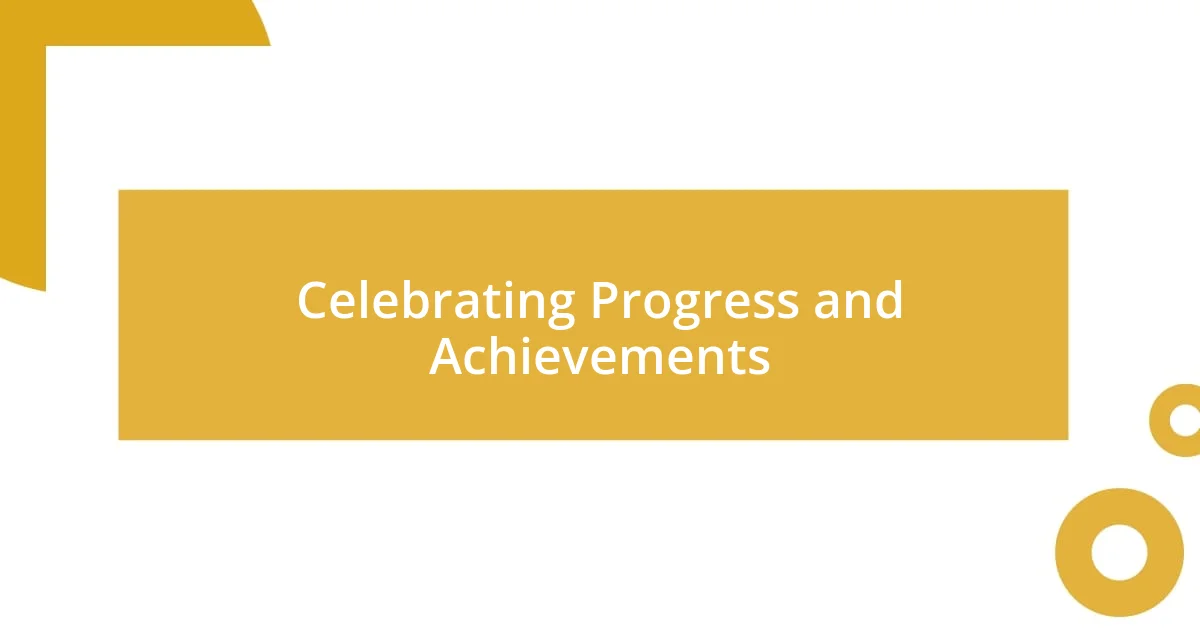
Celebrating Progress and Achievements
There’s something truly uplifting about acknowledging the small milestones along the editing journey. I remember the first time I revisited a piece I thought was finished, only to realize I could enhance it further. It felt liberating to celebrate that moment of realization, recognizing that every edit made me a better writer. Have you ever felt that rush of excitement when you discover the potential in your work?
Looking back, I’ve started making it a habit to reward myself for every substantial edit completed. After finishing a rough draft and seeing it transformed, I treated myself to a favorite snack or a relaxing evening of my favorite show. These little celebrations not only boosted my motivation but reinforced the notion that progress deserves recognition, no matter how small. Why not treat yourself when you achieve a goal? You deserve to enjoy the fruits of your labor.
Moreover, I began documenting my progress in a journal. Each entry reflected my growth and milestones, from conquering difficult edits to fully completing projects. There’s a certain pride that comes from flipping through those pages and witnessing how far I’ve come. It’s as if I’m cheering for my past self, reminding me that growth is a journey filled with ups and downs. Have you ever thought about keeping a record of your achievements? It might just inspire you to keep pushing forward!
